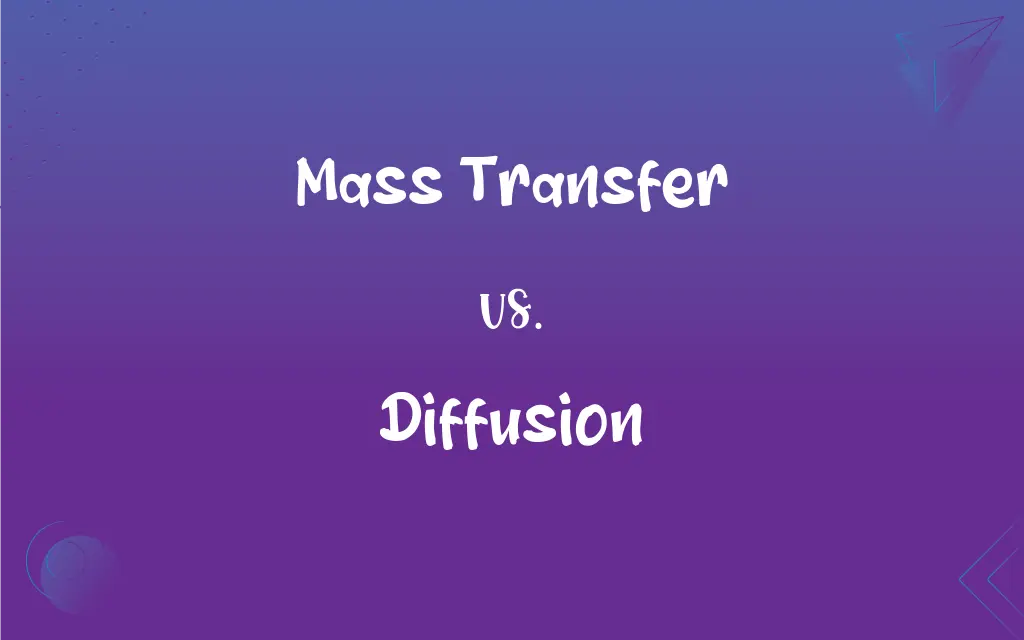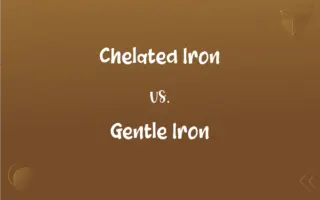Mass Transfer vs. Diffusion: What's the Difference?
Edited by Janet White || By Harlon Moss || Published on December 20, 2023
Mass transfer is the movement of mass from one location to another, often involving different phases, while diffusion is a specific type of mass transfer where substances move from high to low concentration.

Key Differences
Mass transfer encompasses the broader movement of substances, potentially between different phases (solid, liquid, gas). Diffusion specifically refers to the movement of particles due to a concentration gradient within a single phase.
Mass transfer can be driven by various factors like concentration gradients, pressure, or temperature differences. Diffusion is driven solely by concentration gradients.
Mass transfer is a key concept in fields like chemical engineering, where it involves processes like absorption, distillation, and extraction. Diffusion is crucial in areas like material science, biology, and chemistry for processes within homogeneous phases.
Mass transfer mechanisms can include diffusion but also involve convective transport and other methods. Diffusion is a passive process, relying solely on the random movement of particles.
An example of mass transfer is the evaporation of water into air, involving phase change. An example of diffusion is the spreading of a perfume's scent in a room.
ADVERTISEMENT
Comparison Chart
Definition
Movement of mass from one location to another, often between phases.
Movement of particles from high to low concentration within a phase.
Driving Forces
Concentration gradients, pressure, temperature.
Concentration gradients.
Applications
Chemical engineering, industrial processes.
Material science, biology, homogeneous processes.
Mechanisms
Includes diffusion, convective transport.
Passive, random movement of particles.
Examples
Evaporation, distillation, extraction.
Spreading of a scent, gas mixing.
ADVERTISEMENT
Mass Transfer and Diffusion Definitions
Mass Transfer
Fundamental in separation processes.
Extraction involves mass transfer of a solute between two solvents.
Diffusion
Movement of particles from high to low concentration.
Oxygen diffuses from the lungs into the bloodstream.
Mass Transfer
Movement of substances in various processes.
Mass transfer is critical in designing a distillation column.
Diffusion
Spontaneous mixing of substances.
In a solution, sugar molecules undergo diffusion to spread evenly.
Mass Transfer
Transfer of mass between different phases.
In boiling, mass transfer occurs from liquid to vapor phase.
Diffusion
Essential process in cellular functions.
Nutrients diffuse into cells through their membranes.
Mass Transfer
Occurs in biological systems like respiration.
Oxygen and carbon dioxide undergo mass transfer in lungs.
Diffusion
Affects properties of materials.
Diffusion of atoms can alter the strength of alloys.
Mass Transfer
Important in pollutant dispersion.
Pollutants in a river demonstrate mass transfer from industrial effluents.
Diffusion
Spread of pollutants in the environment.
Greenhouse gases diffuse into the atmosphere from various sources.
Diffusion
The process of diffusing or the condition of being diffused
The diffusion of new technology around the world.
Diffusion
The scattering of incident light by reflection from a rough surface.
FAQs
What are examples of mass transfer in nature?
Examples include water evaporation and gas exchange in lungs.
What is mass transfer?
Mass transfer is the movement of mass from one location to another, often involving phase changes.
What is diffusion?
Diffusion is the process where particles move from an area of high concentration to low concentration.
Is mass transfer always a slow process?
The rate of mass transfer varies depending on the mechanism and conditions.
What factors affect diffusion rate?
Temperature, medium, and concentration gradient affect diffusion rate.
Does diffusion require energy?
Diffusion is a passive process and does not require external energy.
How does mass transfer occur in industrial processes?
Mass transfer in industry can occur through distillation, extraction, or absorption.
Is diffusion only a physical process?
Diffusion occurs in physical, biological, and chemical contexts.
Can diffusion occur in solids?
Yes, diffusion can occur in solids, though it's slower than in liquids or gases.
How is mass transfer measured?
Mass transfer can be quantified by mass flux or transfer rates.
Can diffusion be controlled?
Diffusion can be influenced by controlling the environment, like temperature.
What is an example of diffusion in daily life?
The scent of cooking spreading through a house is an example of diffusion.
Can mass transfer be accelerated?
Yes, by increasing temperature or using catalysts, mass transfer can be accelerated.
How is diffusion different from osmosis?
Diffusion is the movement of any particles, while osmosis specifically involves water.
Can mass transfer occur without a medium?
Mass transfer typically requires a medium, though it can occur in vacuum under certain conditions.
Is diffusion important in human body?
Yes, diffusion is vital for processes like oxygen transport in blood.
What role does mass transfer play in pollution control?
Mass transfer is key in designing systems to control or reduce pollution.
What industries rely heavily on mass transfer?
Chemical, pharmaceutical, and environmental engineering industries.
Are there any health risks associated with mass transfer?
Improper handling of mass transfer processes can lead to exposure to hazardous materials.
Is diffusion always beneficial?
While often beneficial, uncontrolled diffusion can lead to undesirable mixing or contamination.
About Author
Written by
Harlon MossHarlon is a seasoned quality moderator and accomplished content writer for Difference Wiki. An alumnus of the prestigious University of California, he earned his degree in Computer Science. Leveraging his academic background, Harlon brings a meticulous and informed perspective to his work, ensuring content accuracy and excellence.
Edited by
Janet WhiteJanet White has been an esteemed writer and blogger for Difference Wiki. Holding a Master's degree in Science and Medical Journalism from the prestigious Boston University, she has consistently demonstrated her expertise and passion for her field. When she's not immersed in her work, Janet relishes her time exercising, delving into a good book, and cherishing moments with friends and family.
































































